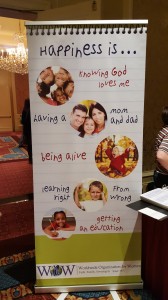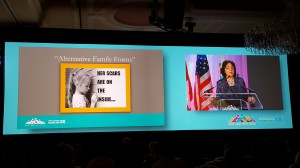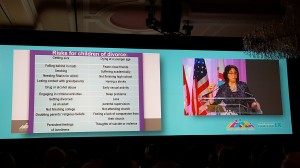
Countering a continuing social slide toward non-family friendly social and government policies means conservative advocates have to first “assess the damage” before they can work to shore up traditional family values.
Speakers at a Thursday plenary session during the World Congress of Families addressed the need to stand together for beliefs on the family, stand for religious freedom and fight for children affected by the sexual revolution.
As an example of the hopeful changes in the family, Steve Smoot, president of the Family First Foundation, noted China’s lift of its one-child regulation in families.
Smoot spoke about the power and unity people can have together as they come to know that “there are more with us than against us, and together, we can make a difference,” he said.
Belief in the divinity of the family
Samuel Rodriguez Jr., president of the National Hispanic Christian Leadership Conference, said his father told him when he was about seven years old that “at the end of the day, it’s all about family.” That belief, which includes the family’s divine nature, transcends the political sphere, Rodriguez said.
“It’s beyond me to believe, to embrace the idea that a legislative initiative, that a decree from the Supreme Court, that a political ideology has the power or the authority to redefine the institution that was created and ordained by God the Almighty,” he said.
He said the family is ordained by God. “It is the heart of God by which we experience the fulness of God’s glory,” Rodriguez said. “It’s not the agenda of the donkey or the agenda of the elephant. The family comes from the agenda of the lamb, Jesus Christ.”
Having a mother and a father in the home, “is the primary antidote to multigenerational poverty, to multigenerational government dependency,” Rodriguez said. “It is the number one antidote to gang violence, drug abuse, teenage pregnancy, economic disparity, from young men and women dropping out of high school.”
He noted that communities that need the family the most are being attacked in a “spiritual battle,” which reflects the spirits of the biblical Pharaoh, Jezebel and Goliath, “attempting to coerce and prompt families to make bricks without straw.” Those spirits are of intimidation, fear, coercion, and in the metaphor of Herod, “killing families through abortion, killing families through sex trafficking…disconnecting children from mom and dad.”
“These spirits are alive and well today,” Rodriguez said. “But I am not drinking the Kool-Aid.” He used that metaphor to say that regardless of what people see and hear in the news, the traditional view of the family is not dead. Those spirits are not everything. “I still believe that the most powerful spirit on the planet is still the Holy Spirit of Almighty God,” Rodriguez said.
That requires him to “push back against others attempting to define them,” he said, because “today’s complacency is tomorrow’s captivity.”
“With faith and family we can overcome every single adversity,” Rodriguez said. “Uncle Sam may be our uncle, but he will never be our Heavenly Father.”
This belief “requires all of us to come together,” Rodriguez said. “If we rise up with spiritual fortitude, with the wherewithal and…the understanding that God is for us, I believe we will overcome in the name of Jesus.”
Religious freedom
Paige Patterson, president of the Southwestern Baptist Theological Seminary, said religious freedom means acknowledging the ability of each individual to “exercise agency as God does.”
Patterson said that although God warns of the serious consequences of the choices people make, he does not use coercion, but provides freedom of choice. “Government’s major purpose,” he said, “should be to restrict what is evil.”
He used the text of the First Amendment as the backdrop for his remarks: “Congress is to make no religion as a state religion and Congress will do nothing to limit the free exercise of religion.”
“The free world, including the USA, must continue to insist that the hearts of men constitute a sanctuary for the living God and should never be desecrated by the imposition of government or ecclesiastical bodies,” Patterson said. “Humans must be free to seek God according to the dictates of their own conscience.”
“For the sake of God’s first institution, the home,” Patterson said, impositions on religious freedom “must be resisted.”
He said the United Nations’ Universal Declaration of Human Rights says that everyone has the freedom of thought, religion, change of religion, and practice of religion. But in many countries, this article is ignored with no consequence.
People everywhere should, in practice and belief, stand for these freedoms, he said. “The use of coercion in matters of faith is nothing less than a violation of the human soul,” Patterson said. “Jesus established the appropriate means of discussion of religious ideas by depending upon verbal persuasion, logic and keen theological insight, but never on force.”
Patterson told the story of his friend who had died while ministering abroad. He promised to dedicate his life to defending religious freedom in his friend’s memory. “Without that freedom, all other freedoms become relatively meaningless,” he said.
Patterson ended his speech inviting the audience to join him in his promise to make the world a better, more free place.
Children’s rights
Jennifer Roback Morse, president of the Ruth Institute, addressed her organization’s focus on preventing divorce and helping those affected by it — also part of what she calls the sexual revolution.
The sexual revolution includes media and people promoting the idea that sex should be separated from babies and marriage and that people should “wipe out all differences between men and women, except those explicitly chosen by individuals.” All of those ideas “are completely false,” Morse said.
The Ruth Institute is dedicated to the idea that every child should have a home with a loving father and mother. She calls violating this structure an “injustice to the child.”

Morse gave the example of a young girl named Elise, who was fortunate compared to many other children living in “alternate family forms:” she lived with a loving grandmother and, to Morse’s knowledge, didn’t suffer abuse.
But Elise acted out at family gatherings, which her mother, boyfriend, and their baby would attend, Morse said. The gatherings served as reminders to Elise that her mother didn’t love her enough to live with and care for her. Elise’s actions reflected feelings of being a “leftover,” Morse said.
Situations like these present children with competing world views, Morse said. Every child has identity rights and relationship rights with their parents, but parents impose sexual decisions on children, saying they still love the child, just not the other parent. Morse said such reasoning confuses children because each parent is crucial to the child’s identity.
“The granddaddy of all lies is that ‘kids are resilient,'” Morse said. “All of these problems flow from the basic injustice that children are facing.”
Morse said that children from separated families face all types of identity and familial concerns, even if parents say their method of conception shows that the parent loved the child enough to choose them.

Morse said that although millions of children face divorce, separation from parents and situations that put their well-being at risk, she “will never accept this as normal. I don’t care how often it happens, I don’t care what Congress has to say about it.”
Victims, she said, need not stay victims. They can become advocates for positive change. “If you yourself are a survivor, do not be afraid to speak out,” Morse said. “We need to make a second career of speaking the truth about our experiences. Let this be our finest hour.”




